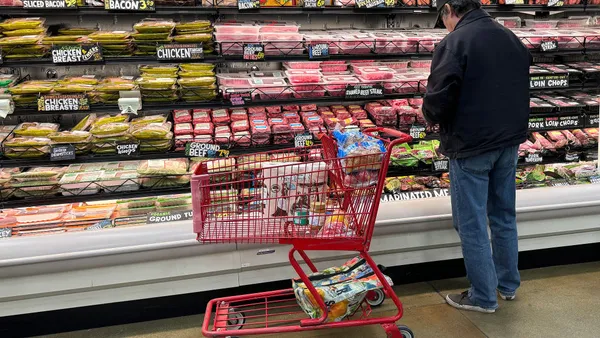Dive Brief:
- New Seasons Market is encouraging consumers to bring in their own reusable containers to package up items bought in the coffee bar, deli, bulk and produce sections, according to a news release. An extension of the company’s Bag It Forward program, each container brought in will earn shoppers a 5-cent reward, which they can put towards their purchase or donate to one of three local non-profits designated by each store.
- New Seasons also announced it will replace plastic tubs for its pre-packaged bulk foods with zipper bags. The move comes after a life-cycle audit commissioned by the retailer found that the packaging switch would result in 78% lower gHg emissions, lower water usage by 80% and decrease human health impacts by 63%.
- In April, the grocer did away with plastic straws in its stores, saving an estimated 180,000 straws from landfills. Over the past two years, the Bag It Forward program has saved more than 7 million plastic bags and sent more than $300,000 to community organizations.
Dive Insight:
For high-end specialty grocers like New Seasons, it pays to have stringent product sourcing and sustainability standards. Addressing ingredients lists and worker welfare, reducing carbon emissions and waste throughout stores and supply chains helps these retailers stand out from mainstream competitors. Moreover, the less price-sensitive consumers with whom these measures resonate are willing to pay the higher price tags and often increase their engagement with stores as grocers’ commitment deepens.
This need to differentiate becomes all the more urgent as the field of specialty retailers continues to transform. In addition to Whole Foods’ slow transformation under Amazon, budget players like Sprouts Farmers Market and Lucky’s Market are planting stores across the country. Lower prices are a selling point for these retailers, putting more pressure on high-end grocers to prove their value to shoppers.
Specialty leaders like New Seasons are still price conscious. A recent trip to a location on Seattle’s Mercer Island revealed plenty of sale endcaps and red-tagged items. But rather than drifting too far towards the center, mission-driven grocers like Mom’s Organic Market, New Seasons and PCC Community Markets, by and large, are deepening their environmental campaigns, updating their product standards and developing new products from local sources.
As Whole Foods continues to promote more mainstream offerings under Amazon, in particular, these grocers are painting a contrasting portrait by marketing their sourcing standards and other measures. Natural Grocers, which just unveiled a new website that does a lot of effective storytelling, hasn’t felt the heat from Whole Foods yet and has in fact seen sales improve in recent quarters.
As mainstream grocers continue to invest in sustainability initiatives, these specialty leaders will need to continue to define and redefine their missions. Giant just announced a zero-waste store while Kroger is donating more food to hunger-relief organizations and plans to phase out single-use plastic bags by 2025.
They will also have to find the right balance between their mission and their store growth. Earlier this year, New Seasons scrapped its expansion plans in northern California as it began reevaluating its business. Wendy Collie, who stepped down as CEO at the same time, told the publication Oregon Business, "The retail landscape in the grocery industry has been changing dramatically and with incredible speed.”









